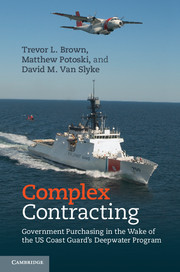Book contents
- Frontmatter
- Contents
- List of figure and tables
- Foreword
- 1 Introduction: the promise and perils of government contracting
- 2 Managing complex contracting in theory and practice
- 3 The Coast Guard’s Deepwater program
- 4 Rules in complex contracts
- 5 Performance incentives in complex contracts
- 6 Complex contracting’s promise and pitfalls: win-win and lose-lose
- 7 Management strategies for complex contracts
- References
- Index
7 - Management strategies for complex contracts
Published online by Cambridge University Press: 05 August 2013
- Frontmatter
- Contents
- List of figure and tables
- Foreword
- 1 Introduction: the promise and perils of government contracting
- 2 Managing complex contracting in theory and practice
- 3 The Coast Guard’s Deepwater program
- 4 Rules in complex contracts
- 5 Performance incentives in complex contracts
- 6 Complex contracting’s promise and pitfalls: win-win and lose-lose
- 7 Management strategies for complex contracts
- References
- Index
Summary
THE AFTERMATH
By the summer of 2007 the Deepwater program was on its last legs. After six months of exposés, investigations, lawsuits, and oversight hearings, the ICGS–Coast Guard relationship turned openly antagonistic. Coast Guard Commandant Allen announced that the Coast Guard would expand its acquisition workforce to take over the program’s LSI functions. On April 17, the Coast Guard announced it had reversed its decision to accept the first eight P-123s and two months later, on June 5, 2007, the Coast Guard filed suit in federal court to recover $96 million from ICGS (O’Rourke, 2010). Meanwhile Lockheed Martin’s and Northrop Grumman’s ICGS partnership began to dissolve. Lockheed quickly blamed Northrop Grumman for the P-123s, claiming that “it would not be financially affected by the government’s refund request because the faulty ships had structural, not equipment, problems,” meaning only Northrop was to blame since it had been responsible for the work on the P-123’s hull. Northrop passed the blame on to its subcontractor, Bollinger Shipyards, which also happened to be the original manufacturer of the 110 patrol boat (Associated Press, 2007). The Deepwater contract was still in effect, but the cooperative partnership the contract was intended to promote had crumbled.
- Type
- Chapter
- Information
- Complex ContractingGovernment Purchasing in the Wake of the US Coast Guard's Deepwater Program, pp. 203 - 235Publisher: Cambridge University PressPrint publication year: 2013

